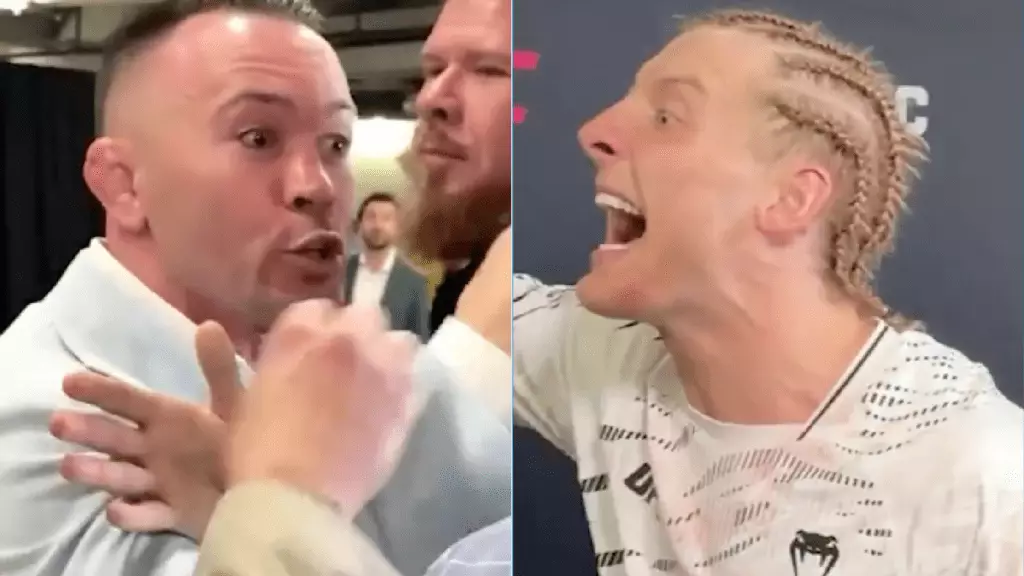On the vibrant night of UFC 314, all eyes were on Miami as fans gathered for an electrifying evening filled with promises of thrilling finishes and intense rivalries. The spotlight shined not just on fighters making headlines inside the octagon, but also on those generating buzz outside of it. Among them, Colby Covington and Paddy Pimblett found themselves entangled in a rivalry that positioned itself at the nexus of sport and spectacle. Their brief yet fiery encounter backstage not only encapsulated the drama prevalent in mixed martial arts (MMA) but also highlighted the often exploited narrative of personal vendettas within the sport.
A Clash of Personalities
In the immediate aftermath of Paddy Pimblett’s impressive victory over Michael Chandler, tension brewed as Covington—known for his brash and controversial persona—sought out the rising star. While both athletes have established themselves in the UFC, their contrasting styles lend themselves to an intriguing rivalry. Pimblett, with his charismatic and jocular demeanor, stands in stark contrast to Covington’s fierce, trash-talking style, which often treads on provocative ground. It’s this clash of personas that drew the fans’ attention as they awaited the aftermath of their confrontation.
Pimblett openly accused Covington of capitalizing on his fame to remain relevant in the chaotic sphere of MMA. “It seems like he’s latched onto my name for some sort of spotlight,” Pimblett remarked, positioning himself as the up-and-comer who refuses to yield to old guard tactics. Such alignments often produce combustible exchanges, as evidenced by their altercation—a hallmark of mixed martial arts, where the lines between sportsmanship and personal grievances are often blurred.
Words as Weapons
When Covington took to the media to respond, he unleashed a barrage of criticisms aimed squarely at Pimblett, questioning both his credentials and character. For Covington, this was not just an opportunity to restore his own standing amidst a two-fight losing streak; it was a chance to assert dominance over a perceived pretender to the throne. “You’ve got a guy like me, a proven entity, and then there’s him, a gimmick who can’t even make significant waves,” he retorted during an interview, dismissing Pimblett’s accomplishments as the product of favorable circumstances rather than authentic prowess.
In the world of professional fighting, the art of humiliation and bravado can often be more impactful than the actual fight statistics. Covington’s use of flamboyant insults aimed at Pimblett, calling him everything from a “gimmick” to a sobering assessment of his recent opponents, serves to enhance the entertainment factor of the rivalry. Fighters like Covington understand that cultivating a persona—be it through trash talk or theatrics—often draws in more viewers and amplifies the stakes of future encounters.
Analyzing the Stakes
Despite the compelling narrative, it’s essential to analyze the implications of Covington’s remarks about Pimblett’s opponents. While Covington’s assertion that Pimblett’s recent victories came against fighters on losing streaks is grounded in fact, it’s also a tactic in the larger game of psychological warfare. By tearing down Pimblett’s credentials, Covington not only attempts to elevate his status but also aims to disrupt the perception of the public regarding Pimblett’s rising star.
The discourse surrounding the two fighters shines a light on the multifaceted nature of MMA. It transcends mere physical competition; it encompasses narratives, perceptions, and a deep-rooted quest for validation from fans and peers alike. Covington suggested that Pimblett would never make a title shot, yet it’s impossible to overlook that the MMA landscape is perpetually shifting, and a well-timed victory can transform an athlete’s career trajectory in an instant.
The Future of Rivalries
As the story between Colby Covington and Paddy Pimblett unfolds, fans and analysts alike will be keenly watching to see how the narrative develops. Will their confrontation lead to a bout that captures the attention of the MMA world, or will it remain merely an echo of verbal jousting? Only time will tell, but one thing is certain: in the world of UFC, drama often serves as the precursor to action, and when egos collide, the potential for an unforgettable showdown grows ever closer. The stage is set for a rivalry that could encapsulate the essence of MMA—a blend of competition, spectacle, and showmanship.

